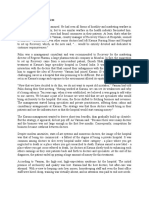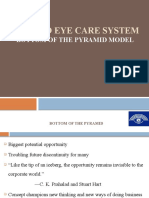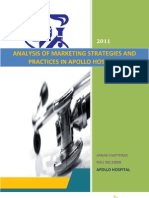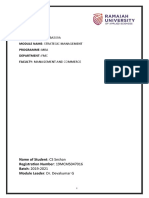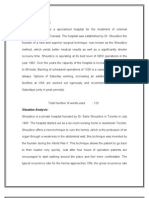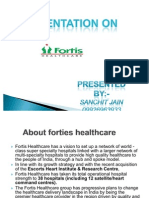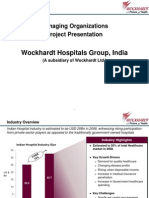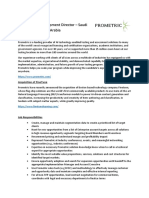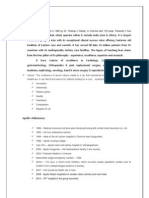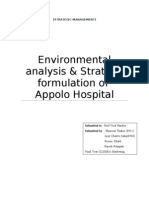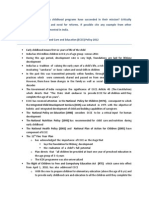Apollo Hospitals Case Writeup
Apollo Hospitals Case Writeup
Uploaded by
Shahu MiskinCopyright:
Available Formats
Apollo Hospitals Case Writeup
Apollo Hospitals Case Writeup
Uploaded by
Shahu MiskinCopyright
Available Formats
Share this document
Did you find this document useful?
Is this content inappropriate?
Copyright:
Available Formats
Apollo Hospitals Case Writeup
Apollo Hospitals Case Writeup
Uploaded by
Shahu MiskinCopyright:
Available Formats
LEAN SIX SIGMA | CASE ANALYSIS | APOLLO HOSPITALS 1
Table of Contents
Introduction to Apollo Hospitals: .............................................................................................. 3
Difference between Hospital and Hospitality: ....................................................................... 3
Differentiation through Hospitality: ...................................................................................... 4
Apollo Hospitals - The Trendsetter: ...................................................................................... 4
Case Questions: .......................................................................................................................... 5
1) What strategy should be used to reduce the numbers of complaints and sustain the culture
of excellence at Apollo hospitals, Bangalore under the leadership of Dr Panyala? .............. 5
An integrated system.......................................................................................................... 5
Feedback Loop: .................................................................................................................. 6
Better use of Technology ................................................................................................... 6
Use of Analytics:................................................................................................................ 6
Availability of Doctors and Nurses 24/7: .......................................................................... 6
Policies: .............................................................................................................................. 6
Promotion........................................................................................................................... 6
Staff training and support................................................................................................... 7
Tracking ............................................................................................................................. 7
Data collection ................................................................................................................... 7
2) Given the manual intensive process involved in addressing the hospitality issue, what is
good sigma level? Could Apollo set a target for sigma level in hospitality? ........................ 8
How to achieve? ................................................................................................................. 8
Quantitative improvement ................................................................................................. 8
LEAN SIX SIGMA | CASE ANALYSIS | APOLLO HOSPITALS 2
Introduction to Apollo Hospitals:
"The Indian hospital industry accounting for 80% of the total healthcare market is expected to
touch US$ 132 billion by 2023" -Ministry of Commerce and Industry Government of India.
"At present Apollo Hospitals have more than 10,000 beds across 73 hospitals, more than 4500
pharmacies, more than 300 clinics, 1100 diagnostic centres and 200 Telemedicine units across
17 countries" -Apollo Hospitals website.
"The company's segments include healthcare, pharmacy, and others. The healthcare segment
consists of hospitals, hospital-based pharmacies, and projects and consultancy services. Its
tertiary care hospitals provide care in over 50 specialties, including cardiac sciences, oncology,
neurosciences, critical care, orthopaedics, radiology, gastroenterology, and transplant. The
company also provides project consultancy services, health insurance services, education and
training programs, and research services. It also operates birthing centers, day surgery centers
and dental clinics" -Ministry of Commerce and Industry Government of India.
Difference between Hospital and Hospitality:
Hospital:
• "An institution where the sick or injured are given medical or surgical care" -Merriam-
Webster
• Patients seek treatment.
• Sentiment of people could be frustration, irritation, depression, insecurity etc.
Hospitality:
• "The activity or business of providing services to guests in hotels, restaurants, bars,
etc." -Merriam-Webster
• Healthy and normal people.
• Purpose could be leisure, vacation, business etc.
Apollo Hospitals Enterprise Limited aims to provide hospitality of premium hotels in their
hospitals. The best doctors, the best treatment and the best hospitality all at one place.
LEAN SIX SIGMA | CASE ANALYSIS | APOLLO HOSPITALS 3
Differentiation through Hospitality:
The best-in-class service relies on constant innovation and demands continuous and sensitive
focus on all issues that may affect the patient's stay in a hospital.
Believed that the services provided to the patients would
differentiate Apollo Hospitals from others. Other competitors
may replicate infrastructure within short span of time, but not the
service culture. To ensure the that the hospital provides the best
services, he had set up a quality department in Apollo Hospitals
Dr. Umapathy Panyala,
Bangalore. He wanted to develop the benchmarks and Sigma
CEO, Apollo Hospitals
metrics and replicate the system in all Apollo Hospitals in the
country.
Dr. Ananth N Rao was appointed as the Head-Quality Cell & Sr. Consultant Biochemistry &
Metabolic Diseases & Member Secretary Ethics Committee from
March 2009 to March 2017. Lean Six-Sigma black belt of the
Indian Statistical Institute, Chennai. He believed that the
hospitality aspect would differentiate Apollo Hospitals from its
competitors so he wanted to integrate healthcare and hospitality.
Hospitality aspects included each and every touch points where
patients used to interact with. Patient cure and care at each
Dr. Ananth N Rao
department would play important role in hospitals. He wanted to
implement Six Sigma concept to eliminate complaints and hence dissatisfaction.
Apollo Hospitals - The Trendsetter:
In 1971, the country had 3862 Hospitals, 12180 Dispensaries with a ratio of 6.36 beds per
10000 people. In 1972, Dr. Prathap C. Reddy, Founder of Apollo Enterprise Hospitals Ltd. -
completed his medical career and later, used to send patients from India to abroad for specific
treatments. In 1979, one of his patients succumbed to death as he could not arrange for him to
send him to US for treatment. Thus, Dr. Reddy decided to provide the best treatments that he
saw in West, here in India with emotional touch - 'High Tech with High Touch'. In this venture,
he involved 10K Indian Doctors and 4700 US-based doctors and had 60 doctors invest in the
venture from UK. It gave the patients best care and services and itself becoming a world-class
LEAN SIX SIGMA | CASE ANALYSIS | APOLLO HOSPITALS 4
pioneered healthcare system in India. Apollo focused on technological excellence and was the
first in many areas in the country. Launched Oncological Robotic Surgery, first in South Asia
and many more. Dr. Preetha Reddy, MD of AEHL and Pioneer Tender Loving Care (TLC)
Mantra was applied to every patient at Apollo. This mantra integrated service delivery with
clinical outcomes which resulted in exceptional patient experiences.
Case Questions:
1) What strategy should be used to reduce the numbers of complaints and
sustain the culture of excellence at Apollo hospitals, Bangalore under the
leadership of Dr Panyala?
An integrated system
The complaints system should be integrated into the work of the whole organization. This
means that:
• Complaints are used to identify gaps in the quality of the service,
• Investigation of complaints is collaborative, and
• Information is shared among management teams (including clinicians and quality
improvement teams), administrators and consumers.
In a fully integrated system, complaints can highlight adverse events that may otherwise have
been overlooked. Furthermore, complaints data can be aggregated with incidents data to
provide more complete information.
LEAN SIX SIGMA | CASE ANALYSIS | APOLLO HOSPITALS 5
Feedback Loop:
Creating a system where feedback is encouraged allows for consumers to make positive
comments as well as complaints.
Better use of Technology
Use of technology at its fullest not only for the treatment purpose (generating report quickly
etc.), but also for hospitality can help hospitals to win customer’s loyalty.
Use of Analytics:
Collected feedback from customers on a regular basis can be stored and Analytics can be used
on top of that data to predict the system to make it efficient which will help the hospital to give
better experience to their patients in terms of treatment as well as hospitality.
Availability of Doctors and Nurses 24/7:
Ultimate aim of a hospital is to provide good treatment and for that, Doctors and nurses should
be available to handle any emergency situation.
Policies:
The hospital needs to have policies on how complaints will be handled and on how adverse
events will be treated. These policies need to be clear to all staff.
Promotion
The organization demonstrates that it actively seeks feedback from consumers and their
families through the way it promotes the complaint process. The complaint process should be
advertised widely and it should be clear to patients and their families how they can make
comments about the service or express their concerns. The overriding message from the
organization needs to be that all feedback is welcome, whether positive or negative.
LEAN SIX SIGMA | CASE ANALYSIS | APOLLO HOSPITALS 6
Staff training and support
An organization that is committed to better complaint handling will ensure that its staff is
properly trained.
Tracking
Once the complaint is recorded, there must be a system for tracking complaints. A
computerized system will enable ‘flags’ to be sent to relevant staff for them to take action. The
complaints manager is responsible for coordinating complaints. Monitoring of complaints
progress, particularly more serious complaints, should be a regular agenda item at quality and
risk management meetings.
Data collection
To ensure that systemic problems can be identified and dealt with, it is most important that
organizations have adequate data collection tools. This will enable data to be aggregated and
analyzed to identify trends. This will also ensure wider transparency and public accountability,
which are key aspects of a high quality health care system.
Good data collection means the organization can:
• learn from mistakes,
• identify systemic issues,
• reduce risk in the future.
Reporting
This is an essential element of an integrated system. There must be systems set up to report on
the outcome of complaints, as well as a system for analyzing and reporting on trends identified
by complaints.
Reporting has three main components:
• Reporting to the consumer, family or friend who made the complaint (this is discussed further
in the section on ‘Complaint handling processes).
• Reporting to the quality systems of the organization and to senior management – to enable
decisions to be made regarding organizational change, policies and resourcing.
LEAN SIX SIGMA | CASE ANALYSIS | APOLLO HOSPITALS 7
• Reporting to staff – both to staff involved in a complaint and, if there are broader issues
involved, staff to inform them of changed procedures/policies and to facilitate learning and
change. Complaints can be used as a concrete example of why change might be needed
2) Given the manual intensive process involved in addressing the hospitality
issue, what is good sigma level? Could Apollo set a target for sigma level in
hospitality?
Presently period from march 2011 to December 2012 1434 complaint were received from
among the 138600 in patients treated during the period which makes approximately 1.03%
complaints.
The company objective should be reach sigma level of 6 which can only be achieved by
working upon certain key aspects
A good sigma level in hospitality industry will be to work upon these aspects
• Smooth admission procedure
• Friendly medical and non-medical staff
• Comfortable furniture
• Varied choices of food menu
• Attractive surroundings
• Recreational facilities
• Privacy
• Clear signposting
• Adequate Provision for the visitors
Apollo Can definitely set a target sigma level if it works upon two important challenges
1. Patient’s sentiment towards the hospitality provided
2. Design a process improvement plan that is affordable
How to achieve?
Customer feedback-treating each complaint as a defect. All services that did not require core
clinical expertise were classified as hospitality service, including service such as billing,
dietician service, food and beverages, facility housekeeping, nursing, facility an overall
operations. All the metrics defined and mapped can be helpful as a sigma metrics.
Quantitative improvement
Working on each problem as defect would not only help in reducing the number of complaints
but also improve the service levels
Word Frequency count-word frequency count will help in improving the problem areas which
will help in benchmarking.
LEAN SIX SIGMA | CASE ANALYSIS | APOLLO HOSPITALS 8
You might also like
- Appollo Case StudyDocument1 pageAppollo Case StudyNirmalya MukherjeeNo ratings yet
- 7 Ps of Service Marketing - Apollo HospitalDocument19 pages7 Ps of Service Marketing - Apollo HospitalDinesh Babu Pugalenthi89% (36)
- Apollo Case Study StrategyDocument16 pagesApollo Case Study StrategyKundan KumarNo ratings yet
- Marketing of Health ServicesDocument2 pagesMarketing of Health Servicessumanth0% (2)
- CSR - Aravind Eye Hospital - Bottom of The Pyramid ModelDocument15 pagesCSR - Aravind Eye Hospital - Bottom of The Pyramid Modelmitz9008100% (1)
- Nutricia Middle East Group 3Document6 pagesNutricia Middle East Group 3Divya Yadav50% (2)
- High NoonDocument3 pagesHigh Noonhassmuz100% (2)
- Firm Analysis: Accenture, Inc.: Assignment #2Document5 pagesFirm Analysis: Accenture, Inc.: Assignment #2John DarwinNo ratings yet
- Curriculam Vitae: Kailash Chandra SinghDocument4 pagesCurriculam Vitae: Kailash Chandra SinghDx DhrmNo ratings yet
- Apollo HospitalsDocument5 pagesApollo HospitalsAmar JajuNo ratings yet
- Apollo HospitalsDocument5 pagesApollo HospitalsArnab ChatterjeeNo ratings yet
- Apollo Marketing ServicesDocument36 pagesApollo Marketing ServicesangelicankitNo ratings yet
- Fortis HealthcareDocument11 pagesFortis HealthcareRicha SinghNo ratings yet
- Apollo Hospital Marketing Assignment: 1. Executive SummaryDocument13 pagesApollo Hospital Marketing Assignment: 1. Executive Summaryraghavi20No ratings yet
- Analysis of Fortis HealthcareDocument20 pagesAnalysis of Fortis Healthcareauli2100% (1)
- NH - Cardiac Care of The PoorDocument11 pagesNH - Cardiac Care of The PoorJordan ScottNo ratings yet
- Apollo Case StudyDocument4 pagesApollo Case StudyAbhishek GuptaNo ratings yet
- Module Code: 19Mba509A Module Name: Strategic Management Programme: Mba Department: FMC Faculty: Management and CommerceDocument29 pagesModule Code: 19Mba509A Module Name: Strategic Management Programme: Mba Department: FMC Faculty: Management and CommerceannetteNo ratings yet
- Legal Aspects of Business 2E: Daniel AlbuquerqueDocument20 pagesLegal Aspects of Business 2E: Daniel Albuquerqueswati rathNo ratings yet
- BPR Case HoneywellDocument31 pagesBPR Case HoneywellFarhan Abdul MalikNo ratings yet
- Hul - BCGDocument14 pagesHul - BCGEngr Muhammad Talha IslamNo ratings yet
- Shouldice HospitalDocument10 pagesShouldice HospitalbdskaranNo ratings yet
- Narayana HrudayalayaDocument8 pagesNarayana HrudayalayaAravind Kambhampati100% (2)
- Aravind Eye Hospital, Madurai, IndiaDocument8 pagesAravind Eye Hospital, Madurai, IndiaVarun Jain100% (1)
- Summary & Questions Quality Metal Service CenterDocument2 pagesSummary & Questions Quality Metal Service CenterRahul RathoreNo ratings yet
- Lecture 7Document33 pagesLecture 7SannaNo ratings yet
- Narayan Hrudalaya Case Study AnalysisDocument5 pagesNarayan Hrudalaya Case Study Analysisdarshak kansagraNo ratings yet
- Entrepreneurship Development Case Study - 1 Intrapreneurship at Davita Healthcare PartnersDocument3 pagesEntrepreneurship Development Case Study - 1 Intrapreneurship at Davita Healthcare PartnersAvicennaNo ratings yet
- Enlightened Shareholder ModelDocument38 pagesEnlightened Shareholder Models_nalzaNo ratings yet
- Apollo SWOTDocument5 pagesApollo SWOTaseem8880% (1)
- Risk Management With A Duration Gap ApproachDocument44 pagesRisk Management With A Duration Gap ApproachDicto RockyNo ratings yet
- Hospital Market in India Hospital Market in India: July 2013Document24 pagesHospital Market in India Hospital Market in India: July 2013Srikanth KasturiranganNo ratings yet
- Automation of Disability Claims Handling at InsureitDocument3 pagesAutomation of Disability Claims Handling at InsureitRahul AryanNo ratings yet
- Business Strategy For 1298Document20 pagesBusiness Strategy For 1298Aniket Pallav0% (1)
- Rallis India Limited - Restructuring and Turnaround StrategyDocument26 pagesRallis India Limited - Restructuring and Turnaround StrategyRAGHVENDRA BAJPAI EPGDIB 2017-19100% (1)
- Ferns N Petals Flowering Through A Unique Franchising Model SWOT AnalysisDocument8 pagesFerns N Petals Flowering Through A Unique Franchising Model SWOT Analysiskaran kapoorNo ratings yet
- ABC Costing (1) CostDocument17 pagesABC Costing (1) CostMuhammad BilalNo ratings yet
- Abhishek Bhushan - Capital - Structure - ConundrumDocument3 pagesAbhishek Bhushan - Capital - Structure - ConundrumAbhishek Bhushan100% (1)
- o F Fortis HospitalDocument15 pageso F Fortis HospitalPrakriti Sinha0% (1)
- Wockhardt Hospitals Group, India: Managing Organizations Project PresentationDocument18 pagesWockhardt Hospitals Group, India: Managing Organizations Project PresentationSameep JainNo ratings yet
- Crown Point Cabinetry Case StudyDocument15 pagesCrown Point Cabinetry Case StudyRohit TiwariNo ratings yet
- Red Ocean Traps Section CDocument11 pagesRed Ocean Traps Section CAathira MenonNo ratings yet
- Case Solution For Intrapreneurship at Alcatel-LucentDocument1 pageCase Solution For Intrapreneurship at Alcatel-LucentCase Solutions and AnalysisNo ratings yet
- Zydus Report 1Document19 pagesZydus Report 1Arati KhatekarNo ratings yet
- 5.aligning Service Design & StandardsDocument14 pages5.aligning Service Design & StandardsNeha RajputNo ratings yet
- Reckitt Benckiser HRM Case SolutionDocument64 pagesReckitt Benckiser HRM Case SolutionMohammad RafiNo ratings yet
- Assignment II - Case Study EvaluationDocument11 pagesAssignment II - Case Study Evaluationdevics1997No ratings yet
- CF PRESENTATION (DABUR) FinalDocument15 pagesCF PRESENTATION (DABUR) FinalSandeep ShuklaNo ratings yet
- Study of Retail Mix at Various Outlets of Reliance FreshDocument7 pagesStudy of Retail Mix at Various Outlets of Reliance FreshUday Dakre0% (1)
- Prometric - Business Development Director Saudi ArabiaDocument2 pagesPrometric - Business Development Director Saudi ArabiaHani EnayahNo ratings yet
- FAQ ch12Document8 pagesFAQ ch12rheyliuNo ratings yet
- Are DV Ia: Reliance Industries: Building Execution Excellence in A N Emerging MarketDocument4 pagesAre DV Ia: Reliance Industries: Building Execution Excellence in A N Emerging Marketkanchan palNo ratings yet
- Apollo HospitalDocument5 pagesApollo Hospitalabhishek221No ratings yet
- Appolo AssignmentDocument13 pagesAppolo AssignmentAparna R GuptaNo ratings yet
- Environmental Analysis & Strategy Formulation of Appolo HospitalDocument21 pagesEnvironmental Analysis & Strategy Formulation of Appolo HospitalgotudonNo ratings yet
- Apollo Hospitals: A Porter Five (5) Forces AnalysisDocument6 pagesApollo Hospitals: A Porter Five (5) Forces AnalysisAkash KumarNo ratings yet
- Apollo HospitalsDocument29 pagesApollo HospitalsSaloni NandaNo ratings yet
- 7 Ps of Service Marketing Apollo HospitalDocument19 pages7 Ps of Service Marketing Apollo Hospitalsab_fthNo ratings yet
- Apollo Hospitals - BOMA Scope - UH BangladeshDocument14 pagesApollo Hospitals - BOMA Scope - UH BangladeshHamayet RaselNo ratings yet
- SCM - Group - B8 - Group AssignmentDocument16 pagesSCM - Group - B8 - Group AssignmentShahu MiskinNo ratings yet
- SCM Group B8 Group Assignment 2Document18 pagesSCM Group B8 Group Assignment 2Shahu MiskinNo ratings yet
- CSE - Group - 3 - Group AssignmentDocument14 pagesCSE - Group - 3 - Group AssignmentShahu Miskin100% (1)
- Group 5 - TEOM - Group Assignment 1Document21 pagesGroup 5 - TEOM - Group Assignment 1Shahu MiskinNo ratings yet
- Digital MarketingDocument56 pagesDigital MarketingShahu MiskinNo ratings yet
- CRM SurveyDocument15 pagesCRM SurveyShahu MiskinNo ratings yet
- Return To TOC: Dowty Propellers Standard Practices ManualDocument18 pagesReturn To TOC: Dowty Propellers Standard Practices ManualNicolás PiratovaNo ratings yet
- Hackathon Problem StatementsDocument4 pagesHackathon Problem Statementspavanbasavaraj25No ratings yet
- Unit 3 The Muscular SystemDocument3 pagesUnit 3 The Muscular SystemCosmina CorbeanuNo ratings yet
- Perna Viridis, Commonly Called As The Philippine Green Mussel, Is A Bivalve MusselDocument2 pagesPerna Viridis, Commonly Called As The Philippine Green Mussel, Is A Bivalve MusselLouise Laine DayaoNo ratings yet
- StuffDocument4,804 pagesStuffSonder LegariNo ratings yet
- Celerio 99011M76M11 74E PDFDocument326 pagesCelerio 99011M76M11 74E PDFabhi24alokNo ratings yet
- Est MCQs of 1st,2nd and 3rd ChaptersDocument27 pagesEst MCQs of 1st,2nd and 3rd Chapterssahajbirajdar1006No ratings yet
- National Early Childhood Care and Education Policy 2012Document5 pagesNational Early Childhood Care and Education Policy 2012amarsinha1987No ratings yet
- Nirc As Amended by TrainDocument16 pagesNirc As Amended by TrainadkNo ratings yet
- Goalong Liquor Catalog 20161121 PDFDocument2 pagesGoalong Liquor Catalog 20161121 PDFfk3007772No ratings yet
- Guide For Scaffolds and Other Elevated Work PlatformsDocument80 pagesGuide For Scaffolds and Other Elevated Work Platformsal bauerNo ratings yet
- Choices MethodDocument5 pagesChoices Methodm_franz100% (1)
- Training in Clinical RadiologyDocument12 pagesTraining in Clinical RadiologyAnoop TitusNo ratings yet
- Geography 3rd TermDocument5 pagesGeography 3rd TermJuanNo ratings yet
- TUDOR LV - Brochure - 2022Document16 pagesTUDOR LV - Brochure - 2022Luis NETNo ratings yet
- BOT Policies and Procedures: Hose CIPDocument2 pagesBOT Policies and Procedures: Hose CIPYen NguyenNo ratings yet
- Drag Reduction Promoted by Repetitive Bubble Injection in Turbulent ChannelDocument50 pagesDrag Reduction Promoted by Repetitive Bubble Injection in Turbulent Channelreza.shahisavandi01No ratings yet
- Milestone Master Lease AgreementDocument59 pagesMilestone Master Lease AgreementFauquier NowNo ratings yet
- T500-User Manual-EUDocument24 pagesT500-User Manual-EUSom HuntNo ratings yet
- Drivers Ed Modified Unit 2 TestDocument4 pagesDrivers Ed Modified Unit 2 Testapi-605657849No ratings yet
- NBR Vs EPDM 0616Document4 pagesNBR Vs EPDM 0616ammarashraf91100% (1)
- Unit 2Document49 pagesUnit 2A ABHISHEK MARSHALLNo ratings yet
- Improving Confidence in Well Integrity Cement EvaluationDocument19 pagesImproving Confidence in Well Integrity Cement Evaluationibrahimletaief1985No ratings yet
- WWW - Saberingles, Com - Arllisteningl 24S.html) : Testing What .R:!' IDocument20 pagesWWW - Saberingles, Com - Arllisteningl 24S.html) : Testing What .R:!' Iandreeagabriela28No ratings yet
- Firefly Roofdeck MenuDocument10 pagesFirefly Roofdeck MenuAngelo Marc RioNo ratings yet
- Electrochemistry Assignment CBSE 2020Document4 pagesElectrochemistry Assignment CBSE 2020mitsuhaNo ratings yet
- Datenblatt 4105 UKDocument2 pagesDatenblatt 4105 UKVahid SarfarazNo ratings yet
- Motor DatasheetDocument1 pageMotor Datasheetandrie s lesmanaNo ratings yet



